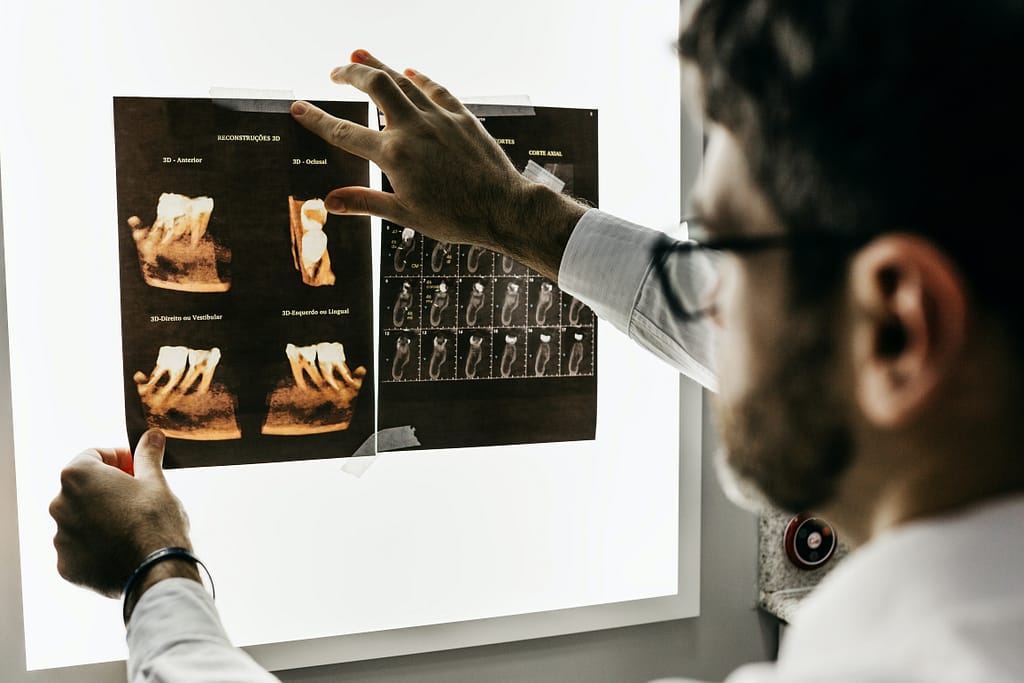
When it comes to dental & oral health, it’s crucial to understand what qualifies as a dental emergency, as timely action can make a significant difference. From a tooth knocked out during a sporting event to a tooth that suddenly cracks while biting into something hard, emergencies can arise unexpectedly. We’ll explore scenarios that warrant immediate attention and provide you with essential guidelines to handle such situations effectively.
If you are experiencing any of the following dental emergencies please contact us immediately.
Book an Emergency Dental Appointment
1. Tooth Avulsion / Knocked Out Tooth
Dental avulsion, or a knocked-out tooth, can occur due to a variety of reasons. Accidents during sports activities, such as a direct blow to the face or a fall, are one of the leading causes of tooth avulsion. Similarly, vehicular accidents, physical altercations, and accidental falls can also result in teeth being knocked out. These traumatic incidents can cause significant force to the mouth, leading to the complete displacement of a tooth from its socket. The tooth’s delicate root cells, which are vital for reattachment, start to die within minutes of being knocked out. Therefore, immediate action is crucial to increase the chances of saving the tooth.
If your tooth gets knocked out, handle it carefully by the crown (the top of the tooth), rinse it gently with milk, and try to reinsert it into the socket. If reinsertion isn’t possible, store the tooth in milk or water. Then seek immediate emergency dental care to increase the chances of saving the tooth.
2. Severe Tooth Ache
If you’re experiencing severe tooth pain that is hindering your daily functioning it is time to see a dentist. A severe toothache can be caused by various factors, including cavities that have reached the nerves of the tooth, a bacterial infection in the tooth’s root, or a cracked tooth. These conditions require proper dental treatment.
If you have severe tooth pain, it is important to take action. Start by rinsing your mouth with warm saline solution, gently flossing to remove any potential debris, and applying a cold compress to the affected area to reduce swelling. Then contact your dentist immediately to diagnose the underlying cause and receive emergency dental treatment.
3. Chipped / Broken Tooth
A broken or chipped tooth can be caused by several factors including biting down on a hard object, facial trauma or injury, a weakened tooth structure due to dental decay or large fillings, or even tooth grinding and clenching of teeth. A broken tooth can lead to a variety of issues. It can cause pain and sensitivity, make eating and chewing difficult, increase the risk of a tooth infection, and may require more extensive and costly dental procedures in the future.
If you break or chip a tooth this is a dental emergency. Start by rinsing your mouth with warm water to clean the area. If there is bleeding, apply pressure and gauze to control it. Contact your dentist right away to schedule an emergency dental appointment to prevent further damage or complications.
4. Abscessed Tooth
An abscessed tooth is typically caused by a bacterial infection that occurs when dental decay or a dental injury allows bacteria to enter the innermost part of the tooth, known as the pulp. This can lead to inflammation and the formation of a pus-filled pocket or abscess. Poor oral hygiene, untreated dental decay, gum disease, and compromised immune function can increase the risk of developing an abscessed tooth leading to severe pain, swelling, and discomfort. If left untreated, the infection can spread to the surrounding tissues, jawbone, and even other parts of the body, leading to potentially serious complications. Additionally, an abscessed tooth can result in the loss of the affected tooth if not properly treated in a timely manner.
In the case of an abscessed tooth, it is important to make an emergency dental appointment before the situation can get any worse. In the meantime, you can rinse your mouth with a warm saline solution or water, take over-the-counter pain relievers (following the recommended dosage), and apply a cold compress to the jaw.
5. Loose Adult / Permanent Tooth
If an adult or permanent tooth becomes loose, avoid wiggling or touching it. A loose adult or permanent tooth can indicate underlying issues with the tooth’s supporting structures, such as gum disease or bone loss. A loose tooth can be the result of trauma/ injury to the tooth or surrounding area. Additionally, teeth grinding, or a misaligned bite can put excessive pressure on the tooth, causing it to become loose over time. If left untreated, the tooth may eventually become so loose that it falls out or requires extraction. A loose tooth can cause pain, difficulty chewing, and affect your ability to speak properly.
If you have a loose adult tooth, it is essential to seek emergency dental attention. In the meantime, maintain good oral hygiene by gently brushing and flossing around the area, and consider eating soft foods to minimize strain on the loose tooth. At your appointment, your dentist will evaluate the situation, determine the cause, and recommend appropriate treatment options.

6. Lost Crown or Filling
A lost dental crown or filling can occur due to various reasons. Some common causes include adhesive failure, degradation over time, underlying tooth decay or damage, trauma or injury to the crowned tooth, or biting down on a hard object that dislodges the crown. It is important to address a lost crown or filling because it exposes the underlying tooth structure, which can lead to further damage or infection.
If you have lost a tooth crown, it is crucial to contact your dentist as soon as possible. Keep the crown if you still have it, rinse it gently with water, and avoid trying to reattach the crown yourself with adhesive or glue.
Understanding what is considered a dental emergency is essential for maintaining oral health and seeking timely care. Situations such as a broken or knocked out tooth, an abscess, a loose adult tooth or severe tooth pain require immediate emergency attention from a Dentist. Promptly addressing these scenarios increases the chances of successful treatment, prevents further complications, and ensures the best possible outcome for preserving your oral health and overall well-being. If you are experiencing any of the above scenarios please contact us for emergency dental services in the Green Bay area.


